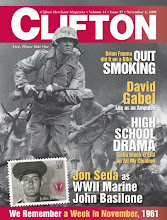The six-member Aref clan attends daily mosque services
By Jordan Schwartz
When you visit the Aref family of West 1st St., you’re greeted before you enter the door.
“The man is here!” Ahmad, 8, shouted to the rest of his family as I walked up the front steps one recent Thursday evening.
Ahmad, who attends School 4 right across the street, is the eldest of four young children and his father, Said, says he’s beginning to take on some of the responsibilities of caring for his three siblings.
Crossing the threshold of the Aref home, you’re welcomed by the sights and scents of Palestinian culture. Ahmad and his sister, Hadeel, 6, bounce up and down on the couch watching a Middle Eastern children’s television program, while their mother Fatima, 26, prepares dinner in the kitchen.
The baby of the family, Abdullah, 1, cries due to all the commotion, and the youngest girl, Dana, 3, sleeps upstairs.
“Family is very important,” explained Said, 31. “It’s kind of number one in everyone’s life. Every time you do something, you ask someone in your family first. They’re always there for you.”
Said’s father, Mohy Iddin, first came to the U.S. in 1954, when he lived for a brief time in Columbus, Ohio. In the early ’60s, he moved to Puerto Rico where there was a growing Arabic community, but Mohy Iddin returned to Palestine in 1977 when his wife, Fada, gave birth to Said.
Aref was born in the small town of Turmos Ayya, just outside the city of Ramallah in the central West Bank. He was the youngest of six children and enjoyed playing soccer growing up.
“It’s a different culture and it’s sometimes dangerous,” he said. “I wasn’t part of the fighting but life was not normal.”
Aref said he knew three people who were killed before immigrating to the United States in 1995. But he didn’t leave his homeland to escape the violence, rather to follow his siblings and take advantage of the educational opportunities America had to offer.
Said attended Clifton High School for one year so that he could improve his English. He said he experienced some prejudice during his time there.
“During the morning rush hour traffic in the hallways, I’d hear derogatory comments, but I was peaceful and wouldn’t respond.”
Following graduation, he studied international business at Montclair State University. After earning his degree, he got a job in White Plains.
Said’s Muslim faith is very important to him and so he would take time every day at work to stop and pray — something that his co-workers may have taken a greater interest in following 9/11.
“I never experienced prejudice because of that, but people around me did,” he said. “I always tell my wife, ‘Don’t put yourself down.’ No one is above the law so just call the police if there’s a problem. Don’t do it the street way.”
Six years ago, Aref began working with his brother, Hamed, as an accountant at H.M.A. Accounting and Tax Services on Main Ave. The firm is mainly Muslim and so salah, or ritual prayer, is no problem during the day.
The Arefs attend services at Omar Mosque on nearby Getty Ave. on a daily basis, especially during the recent Ramadan holiday.
The family’s location is convenient for other reasons as well.
“Corrados is right here and the malls are not far away,” said Fatima, as she brought me a glass of orange juice and a neatly folded paper towel on a golden serving tray. Ahmad, meanwhile, stared curiously at my notepad.
“We like Clifton; my wife knows the area,” Said concluded. “We’re part of Clifton.”
Friday, October 31, 2008
Subscribe to:
Post Comments (Atom)

No comments:
Post a Comment